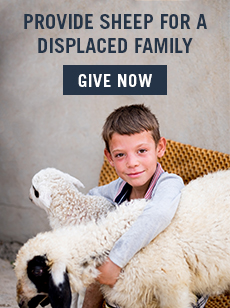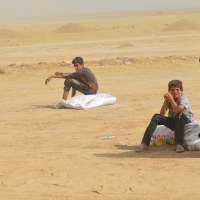
The sun is high in the sky, and heat shimmers above the desert sand in wavy bands. It is oppressive. Nearly a week after fleeing Fallujah for this sandy plain, there is still no tent to protect you, no food to sustain you.
When the time comes for midday prayer, your mind becomes focused. You are displaced from your home, but it is still Ramadan. Like so many others, you fix your attention to worship God in your heart, to acknowledge your need for purity.
And so you begin preparations.
But there is no water to wash before you start praying—the ritual of purification is essential before prayer. So instead, you stoop down, spread your hand wide, and pat the hot desert sand.
It’s the only thing you have.
In the dust you wash your hands three times. First the right hand and then the left. Patting the hot sand again, you wipe the dust down your face three times, from forehead to chin.
Then you returning to the dust, washing your right arm, followed by the left. Three times, up to the elbows. Finally you use the dust to wash your feet, three times.
In the middle of the desert—hungry, thirsty, tired, and bereft of every human comfort—you begin to pray.
In the name of God, the Entirely Merciful, the Especially Merciful…

Every prayer in Islam begins the same way. Before the light of dawn, at midday, in the afternoon, at dusk, in the darkness after sunset—God’s mercy is declared.
Even in the desert.
The first ten days of Ramadan, called the Days of Mercy, are especially poignant for Muslims. Throughout the day, regardless of circumstance, they are encouraged to reflect on God’s mercy.
Then come the second ten days of Ramadan, the Days of Forgiveness. They are especially difficult this year for the families of Fallujah.
Throughout the day the observant Muslim pauses to examine his own heart, seeking forgiveness for any wrong that’s been done, with the full intention of never repeating those mistakes again.

But what about those who caused you so much pain? What about those who have caused you to languish in this desert camp, your former life reduced to rubble?
As an observant Muslim, you try to keep your heart close to God all day long. Peace, justice, and dignity matter to you.
But what about those who destroyed your city, who killed your brothers, and caused your family to starve and to flee to this hot desert? Who will seek his forgiveness for these things?

In the Christian tradition, Pope Francis has declared this to be a year devoted to mercy. Addressing a gathering of Catholic priests during this “Jubilee of Mercy,” he said:
If, as we said, the Gospel presents mercy as an excess of God’s love, the first thing we have to do is to see where today’s world, and every person in it, most needs this kind of overflow of love. We have to ask ourselves how such mercy is to be received. On what barren and parched land must this flood of living water surge? What are the wounds that need this precious balm? What is the sense of abandonment that cries out for loving attention? What is the sense of estrangement that so thirsts for embrace and encounter?

It is late in the evening, and so you stop to pray one last time for the day. At the mercy of the world, you still stop to pray to God the merciful.
These final days of Ramadan are the Days of Redemption, when Muslims renew their commitment to be more merciful—to themselves and to those even poorer than they are.
Those in the desert who continue to observe Ramadan, despite being displaced, may have never heard Pope Francis’ words, spoken only months before the liberation of Fallujah. But we have.
It is hard to imagine a place in more desperate need of mercy more than this one. It is barren and parched, abandoned and estranged, and in real need of an encounter with Love.
Perhaps this is the way we can meet in the desert. Perhaps it is the Entirely Merciful, Especially Merciful God who can draw us together.
Follow the latest developments in Fallujah here.


